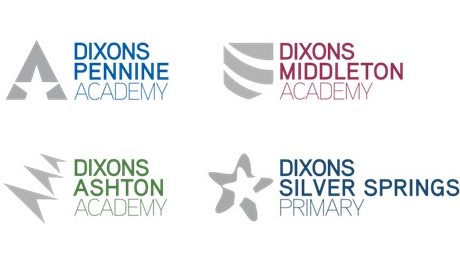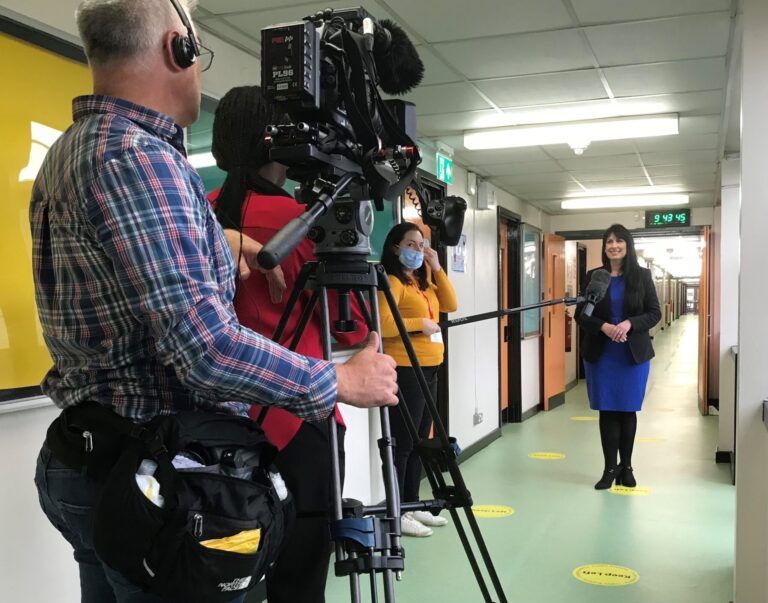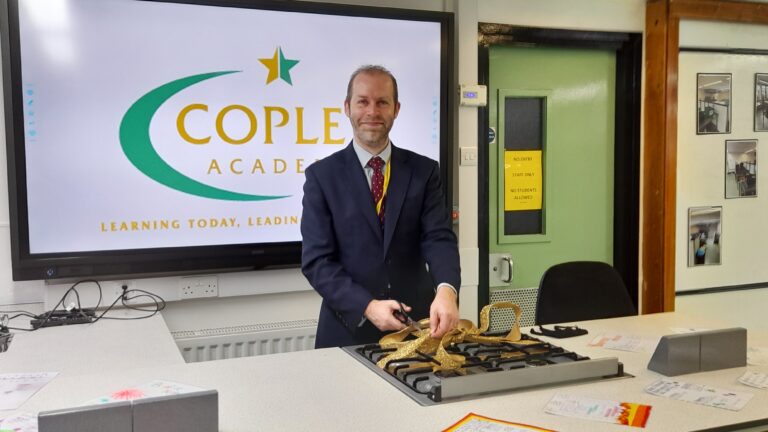
Computing, Enterprise and Media
Key Stage 3
Powerful Knowledge in Computing is based on the ability to abstract and decompose a problem to produce a solution through thorough investigation. Students have opportunities throughout KS3 to produce robust and considered solutions to problems posed in class. Alongside this, it is important students develop an understanding of how the hardware within a computer functions, removing the ‘black box’ nature of technology.
Our KS3 curriculum is designed to ensure that students studying GCSE Computer Science, or any other ICT Qualification, have a grounding in the fundamental concepts covered at KS4. Students start with the ‘big picture’, studying Hardware and Algorithms, giving them the skills to access later topics such as Binary and Hexadecimal, where students study the mathematical makeup of machines.
Over the 3 years, students learn to program in 3 languages, starting with block-based languages before progressing to High-Level Languages. The development of programming skills is also built into physical Computing tasks such as coding thermometers and LED lights to effectively apply the knowledge learnt in earlier Algorithm and Programming units.
Supporting Documents
Key Stage 4
BTEC Level 1/Level 2 Tech Award in Enterprise
Enterprise is an important part of the business sector and plays a major role in the UK’s global economic status. The role of entrepreneurs is to help create wealth for the nation and its citizens through the creation of enterprises that innovate and grow the economy. There are nearly 5 million such businesses in the UK, employing around 14.4 million people. In 2015, small- and medium-sized enterprises contributed £24bn to the UK economy.
The BTEC Enterprise tech award gives learners the opportunity to develop sector-specific knowledge and skills in a practical learning environment. The focus is on the knowledge, understanding and skills required to research, plan, pitch and review an enterprise idea that includes:
- development of key skills that prove aptitude in planning an enterprise activity, including market research, planning, carrying out financial transactions, communication and problem solving.
- knowledge that underpins effective use of skills, such as the features and characteristics of enterprises and entrepreneurs, and the internal and external factors that can affect the performance of an enterprise.
- attitudes and ways of working that are considered most important for enterprise, including monitoring, and reflecting on performance of an enterprise idea and own use of skills.
Through studying BTEC Enterprise, students will complete 3 components of learning:
In this component, learners will have the opportunity to develop knowledge and understanding of the different types of enterprise and their ownership, looking at the characteristics of small and medium enterprises (SMEs) and entrepreneurs with reasons for levels of success. Understand the importance of having a clear focus on the customer and the importance of meeting their needs. Exploring why enterprises are successful, looking at the impact of factors both inside and outside the control of the enterprise, and investigate ways in which situational analysis can be used to support decision making.
Component 2, Planning for and Pitching an Enterprise Activity
In this component, learners will use the research knowledge gained from Component 1 to consider a number of ideas before developing a plan for a realistic micro-enterprise activity. Learners will need to take responsibility for creating and then delivering a pitch for developed their idea to an audience, using knowledge of business, and demonstrating entrepreneurial characteristics, qualities and skills. In the final part of the component learners will use feedback to review their plan and pitch for the micro-enterprise activity, reflecting on plan, pitch and the skills learners demonstrated when pitching.
Component 3, Promotion and Finance for Enterprise
In this component, learners will assess and analyse financial information in an enterprise context to monitor the performance of an enterprise and strategies to improve its performance. Learners will investigate cash flow forecasts and statements, exploring the effects that positive and negative cash flow can have on an enterprise, and suggesting ways to improve them. Leaners will consider the different elements of the promotional mix in order to be able to identify target markets and put forward strategies that enterprises can use to increase their success in the future.
Whilst following the enterprise curriculum and achieving their qualification, learners will, in addition, develop a rich understanding of economies, economic theory, and the history that underpins them, together with various political systems, cultures, and ideologies.
Supporting Documents
BTEC Level 1/2 Tech Award in Digital Information Technology
The digital sector is a major source of employment in the UK. Around 1.46 million people work in digital companies and there are around 45,000 digital jobs advertised at any one time. Digital skills span all industries, and almost all jobs in the UK today require employees to have a good level of digital literacy. The UK has positioned itself to be the ‘Digital capital of Europe’ as it continues to invest billions every year in digital skills and commerce. The modern world expects digital skills to be as important as English and Maths. Having both technical skills and business understanding is the key to success.
The BTEC Tech Award in Digital Information Technology Award will allow learners the opportunity to develop sector-specific knowledge and skills in a practical learning environment, including:
- development of key skills that prove their aptitude in digital information technology, such as project planning, designing and creating user interfaces, creating dashboards to present and interpret data
- processes that underpin effective ways of working, such as project planning, the iterative design process, cyber security, virtual teams, legal and ethical codes of conduct
- knowledge that underpins effective use of skills, processes and attitudes in the sector, such as how different user interfaces meet user needs, how organisations collect and use data to make decisions, virtual workplaces, cyber security and legal and ethical issues.
Through studying BTEC Enterprise, students will complete 3 components of learning:
Component 1: Exploring User Interface Design Principles and Project Planning Techniques.
Learners will develop their understanding of what makes an effective user interface and how to effectively manage a project. They will use this understanding to plan, design and create a user interface.
Component 2: Collecting, Presenting and Interpreting Data.
Learners will understand the characteristics of data and information and how they help organisations in decision making. They will use data manipulation methods to create a dashboard to present and draw conclusions from information.
Component 3: Effective Digital Working Practices.
Learners will explore how organisations use digital systems and the wider implications associated with their use. This includes legal and ethical implications, GDPR and the copyright designs and patents act.
Overall learners will develop practical, transferable skills centred on the development of digital systems.
Supporting Documents
BTEC Media
The creative media sector is a dynamic, growing and rewarding sector to work in, with new opportunities arising continually. The UK’s creative industries as a whole are now worth over £84 billion per year to the UK economy. Working in the creative media industry involves a wide range of practical processes, skills, and techniques, from broadcast media to increasingly interactive products and platforms. As digital technology continues to evolve, media techniques have become more sophisticated and media products are becoming more advanced. However, what hasn’t changed is that media products still have the power to enthral, intrigue and affect audiences.
Students develop valuable skills and techniques in different disciplines, produce a practical response to a digital media brief, and explore potential careers in the industry.
The three components in the qualification give learners the opportunity to develop
broad knowledge and understanding of the media sector and relevant skills such as
research, planning, problem solving and communication.
- Component 1 (30%) has students exploring media to understand their purpose, genre, audience.
- Component 2 (30%) focuses on the development of practical media production skills and techniques.
- Component 3 (40%), students will create their own media product in response to a given client brief.
‘Students will relish the combination of producing exciting practical work and learning insightful Media theories and are encouraged to work to their maximum capacity to secure the best possible personal and academic outcomes.’
Supporting Documents
If you wish to discuss the curriculum for the above subjects further please contact Mr McTeigue, Head of Computing, Enterprise and Media by emailing, jmcteigue@copleyacademy.org.uk.
